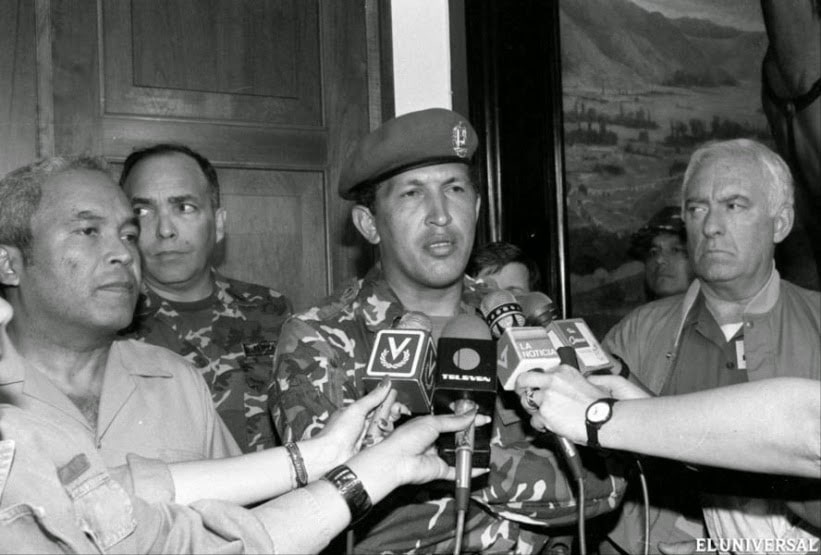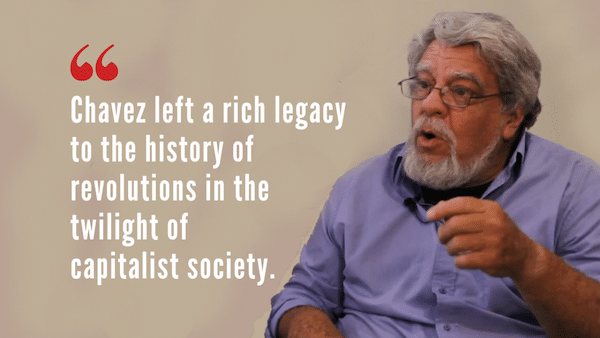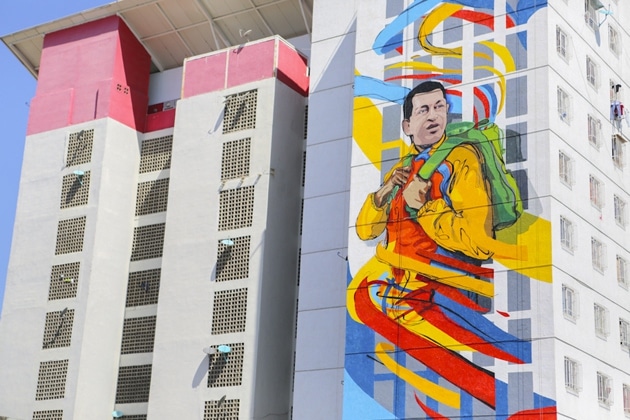The improbable life of Venezuelan television personality Eduardo Rothe has taken him to such revolutionary hotspots as Detroit in the early 1960s, Paris in 1968, and Lisbon in 1974 until he became gainfully employed as a commercial fisherman and occasional smuggler. For Rothe and his audience, that life is an endless source of colorful anecdotes that bring together art, spontaneity and revolutionary practice in a way worthy of the Situationist movement of which he once formed a part. Behind the legend of Rothe, who is best know in Venezuela for his TV personae “Profesor Lupa,” there is a dedicated revolutionary and coherent internationalist. In this interview, Rothe explains his views on the Bolivarian Process.
Two centuries ago, the continent-wide struggle for independence from Spain had its epicenter in Venezuela. Likewise, the first Twenty-First Century revolution in the Americas happened here. What is so special about Venezuela? Why is the country so inclined to insurrection?
Historically, Venezuela has had its peculiarities: it was a very poor colony (and later an independent country) with a very small population. It was always a mono-producing and exporting economy: first leathers, cocoa, and coffee, later petroleum. So Venezuela has a particular economic structure: our country lives off of the rent and that has its implications.
Politically, however, what determines the structure of Venezuelan society is that the independence struggle was tremendously lethal here: more than half of the male population died in the war. As far as the entire population is concerned, one third died in the war. Eighty percent of the cities were looted, burned and abandoned. All this was accompanied by the destruction of the dominating class, both those at service of the colonial power and those who fought for the republic. This left Venezuela in the hands of the generals who led the independence struggle, and they played an important role in forming the nation. Later this military caste was replaced by diverse power groups, but none of them had the hereditary character (or constituted power) that more consolidated oligarchies have achieved in other Latin American countries.
Venezuela is a country of improvised power, a country with governments but not with a state. The concept of nation is an extremely fragile one in Venezuela. That makes Venezuela very flexible when it comes to transformations, which may take a long time to happen, but when they happen, they are intense. All this goes a long way to making possible the experiment of refounding the nation. Imagine that! What Chavez did was to re-found an entire nation, just as Bolívar founded a nation some two hundred years before.
The relation between Bolivar, the nation’s founder, and Chavez, the founder of the new republic, is basically through the military. They were both military men in a very elastic society with a very particular history.
As opposed to European countries where first a people build a nation who then create a state, which then builds an army, here in Venezuela, the military itself created the republic. Thus, the huge importance of military personnel, who are, as Bolivar said, “the people who can,” and they in turn influence the political panorama.

Martin Tovar y Tovar, Batalla de Carabobo, 1921. (Archive)Martin Tovar y Tovar, Batalla de Carabobo, 1921. (Archive)
Much has been said about Chavez and you yourself have contributed to analyzing the figure. How do you place Chavez in history?
Chavez belongs to what Jose Marti and other writers of that era called the “cosmic race” [raza cósmica]: a new people born out of a process that brought together the Spanish conquest and domination, on the one hand, with the struggle for emancipation, on the other. That unity, which comes out of a submitted and oppressed people creates the conditions for revolt, a lived synthesis of impending revolution.
I would go so far as to say that the necessity of revolt in a barren land, in a territory that had nothing, is what gave rise to the army of the Latin American Independence struggle: the war against Spain that burst forth here more than two hundred years ago. In other words, Venezuela, poor and chaotic, was the focus of the independence struggle. More recently, the figure of Chavez emerged in this land in a new effort to free ourselves–the men and women of Latin America–from the domination of all imperialisms, U.S. and European. Chavez is thus a full expression of the cosmic race.
Chavez should also be understood as a unique historical figure. He is unique but not alone, since he has Bolivar and other historical figures as company. Chavez was born out of circumstances, but he was also shaped by history and with the full weight of history… He is the product of history in a particular moment, the man who faced a golden opportunity.
But Chavez also prepared himself to be what he became. He prepared to carry out what he thought could and had to be done.
How did Chavez carry out what had to be done? He called on all the forces of the nation and all the forces of the people (which by the way, are diverse and antagonistic) to rebuild the republic. Hence, we are talking about a revolution aimed at renovating the nation, but it was also a popular revolution aiming at human emancipation. Chavez was able to bring together, in a brilliant way, those two forces in what is known as the Bolivarian Revolution, which also bears the title, not much to my liking, of “Twenty-First Century Socialism.”
Chavez’s genius was to unite, to synthesize those two factors: the nationalist factor and the popular factor. In doing so, he was able to advance, with contradictions but without violence, correcting the course along the way.
Obviously, the two forces that Chavez brought together in a revolutionary unity cannot live alongside each other forever. Dual power doesn’t endure eternally! Nevertheless, we have had eighteen years of it… This brings us to the fact that our problem is not that the state represses–which it doesn’t–but that the organized proletarian forces have not yet begun to act autonomously. They aren’t struggling to constitute themselves as a force aiming to reorganize the whole society.
Because this was a territory where there wasn’t a fully constituted bourgeoisie, because it was so lacking in resources, because it was such a poor Spanish colony, all this made it possible for a man like Bolivar–who was a member of the mantuano or oligarchical class–to emerge as a representative of the whole people. Chavez was himself a synthesis [of two cultures] and like Bolivar, he was able to mobilize all the continent’s rebels to work for the unity of Latin America as a single nation. But in today’s world, that project had to go far beyond the national question. Indeed, Chavez made a rich contribution to the history of those revolutions that are taking place during the twilight of capitalist society.

Hugo Chavez on February 4, 1992, in his famous “Por ahora” (For now”) speech after the failed military insurrection which secured his place in the popular imagination. (Archive)
How would you characterize the Bolivarian Process? It’s a difficult task, but I would like to hear your view.
We need to make a synthesis of the Bolivarian Revolution, which is itself a synthesis. To do so, we can consider other revolutions that also combined processes of national liberation with popular revolution. The Russian Revolution brings together a bourgeois revolution with a revolution of the proletariat and the peasant classes. Venezuela is a country where that synthesis happens as well. It happens here because the state and its institutions do not have much weight in the society. That provides wiggle room for a revolutionary project that brings together both elements. Remember, for instance, that the dominating class in Venezuela, the bourgeoisie, was in a permanent process of change throughout history. It comes from the peasant class and is a result of its “revolutions” and wars.
By the end of the twentieth century, the revolutionary force in Venezuela has become the proletariat, the urban masses, and that class cannot be simply sent back to their fields after a war [as before]. Today, the urban bloc is large and omnipresent in our society.
In a marvelous way, Venezuela’s working class–as is the case with the world proletariat–synthesizes in its experience all the problems of modern capitalism and neoliberalism. Here, we are living an epoch of revolutionary synthesis. For that reason, Venezuela is the object of so many attacks. That’s because [the Bolivarian Process] aims at the unity of the Latin American nation, but it is also an embryo, an experimental project, aiming to completely transform society. The truth is that anything is possible here, if we don’t lose sight of the goal, which is the abolition of capitalism and humanity’s liberation.
At Venezuelanalysis, we try to promote active solidarity and coherent internationalism. You have had a long trajectory as an internationalist: in 1964 you traveled to Detroit to meet with Raya Dunayevskaya and you later moved to Paris, where you were active in the May 1968 insurrection. A few years later, in 1974, you participated in the Revolution of the Carnations in Portugal. What can you tell us about the importance of internationalism today?
Revolutions are internationalist by definition. From the Paris Commune onward, there has never been a true revolution enclosed in a single nation. But there is another element that makes this revolution all the more international. Venezuela, as is the case with all Latin American countries, is a country made up of immigrants. Here, diverse waves of migration from European countries mixed with the indigenous peoples, and they, in turn, mixed with black Africans brought here through the slave trade. So, as you can see, internationalism in this revolution is not an option; instead, it is the base of our social structure and thus of our social revolution.
Those who carried out the Bolivarian Revolution come from multiple origins: they are mestizos, that cosmic race that Marti talked about. In Venezuela’s revolution, we didn’t just commit to our salvation and to the emancipation of our people. We aimed to re-found the Latin American nation, the future “Patria Grande”[*]. Also, like any revolution, this one attempted to solve the great problems of the planet and humanity. Through Chavez, we cast our lot with the environmental struggle and committed ourselves to the social struggles in Europe, the U.S. and beyond. The Bolivarian Revolution has been, from its very beginning, internationalist by vocation.
It would seem fair, then, that the revolutionaries of the world would support this epic struggle, this revolution, as part of the general process of liberation that the world is undergoing.
To wrap up, I would like to ask you to say something about Venezuela on the international stage. What are your thoughts about this situation of global chaos and crisis?
In today’s world, we are living a terrible epoch of the domination by capital and bourgeoisie. The U.S. is facing one of the most profound crisis of its history, and we are just witnessing the beginning of it. I think that Venezuela’s struggle (as part of the general problematic of Latin America and in its relation to the US) is key to all of that. We are struggling against a unipolar world not because we might want a multipolar world in which a multiplicity of capitalist powers–such as Russia, China, India and Brazil–emerge as players. No, we must strive for a multipolar world in which the working class calls the shots. That, of course, must include the U.S. and European working classes.
We are living times of profound crisis in which the [bourgeois] fraction must step to the side for the working masses, since they are the ones who can open a path to the future. The Bolivarian Revolution, because it stands for a new structure of power in Latin America and breaks with the “backyard” logic that the U.S. imposes, is key in this. The problem is not so much the United States, the problem is the capitalist organization of the world.
We are living a transformation, and Venezuela is part of it. Perhaps we won’t witness the end of it, but I’m certain that we are approaching the dawn of an epoch larger than the one marked by the French Revolution. We are in the twilight of the capitalist system. Capitalist barbarism is out in the open for all to see. It can be observed in full daylight, and we will continue to struggle to bring it to an end.
I think that Venezuela’s contribution to the revolution is very important. But the commitment of all the world’s peoples to defending the Bolivarian Process as a manifestation of the new epoch to come, that is much more important!


